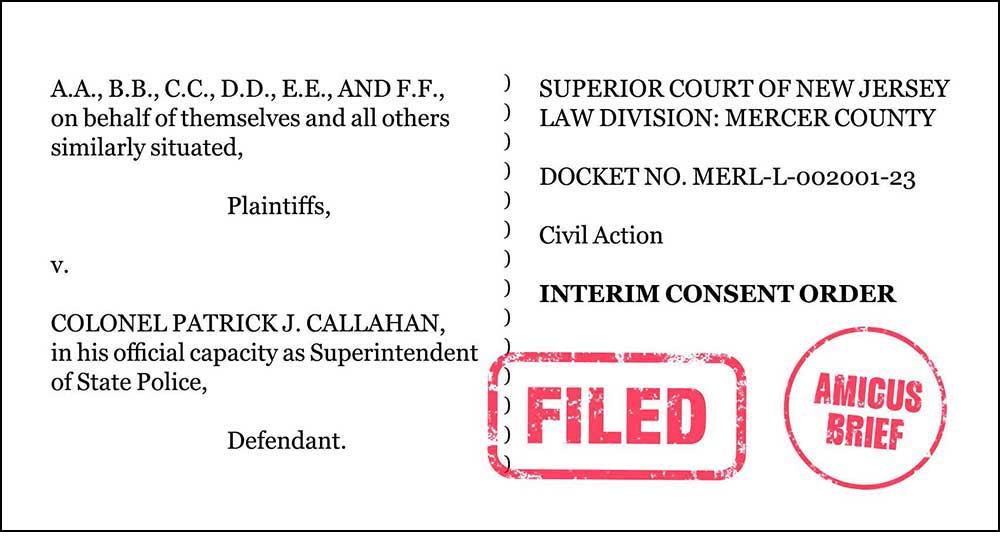Spearheading Change as Friends of the Court
The firm regularly serves as a friend of the court in key cases, advocating for justice and systemic reform. In 2024, we submitted several briefs supporting improvements to the criminal justice system.
Please click below to learn more about these briefs.
-
SEEKING COMPLIANCE WITH THE
STATE’S EXPUNGEMENT LAWS -
ADVOCATING FOR BEST PRACTICES
IN POLICING
Seeking Compliance With the State’s Expungement Laws
New Jersey law allows people with certain criminal convictions to have the matter expunged—removed from their criminal record for most purposes—when the conviction reflects a one-time mistake rather than a pattern of misbehavior. For many, the right to expungement is crucial to their ability to reintegrate into the community. For those individuals seeking expungement, their petitions are time sensitive. The law recognizes that and provides that individuals who seek expungement of their criminal convictions are statutorily entitled to a hearing within 60 days of filing their petition, and prosecutor’s offices and other state agencies must file any objections to an expungement petition within that same 60-day period.
Despite the clear mandate of the expungement law, the Essex County Prosecutor’s Office (ECPO) was routinely failing to meet the 60-day deadline. The Office of the Public Defender (OPD) filed suit, seeking to compel ECPO to meet its deadline or to have the court proceed without ECPO’s input, as the law allows. The court refused the OPD’s request, and the OPD asked the state’s intermediate appellate court to hear its appeal. Because the decision the OPD seeks to appeal was not a final decision in the case, there is no automatic right to appeal, and the OPD must seek permission for appellate review at this stage of the proceedings. The firm represented Volunteer Lawyers for Justice (VLJ), a nonprofit legal services organization that ensures access to justice for people experiencing poverty through its several legal programs, including a reentry legal services program, as a friend of the court in support of the OPD’s request for permission to appeal.
The friend-of-the-court brief argued that ECPO’s decision to spend its resources elsewhere, and the trial court’s belief that it would be onerous for Essex County courts to follow the expungement statute’s clear requirements, does not provide authority for the trial court to ignore the law. The brief asked the Appellate Division to grant the OPD’s application for interlocutory review of the trial court’s order on an accelerated basis. The Appellate Division denied the OPD’s request for leave to appeal, and the OPD and VLJ have now moved before the New Jersey Supreme Court for permission to have the appeal heard and decided by the state’s highest court.

Advocating for Best Practices in Policing
Following several years of litigation stemming from the New York Police Department’s (NYPD) response to various Black Lives Matter protests in 2020, the U.S. District Court for the Southern District of New York was presented with a landmark settlement agreement in Payne v. de Blasio that would transform the way the NYPD polices First Amendment activity to protect the public and press from intimidation and excessive use of police force during demonstrations.
Everyone involved in the litigation, with one exception, signed off on a settlement that would ensure that the NYPD utilizes best practices in accordance with a court-issued consent decree. The Police Benevolent Association of the City of New York (PBA), in an effort to transform its role from a labor union into that of a policymaker, intervened in the case and objected to the consent decree.
After the district court ruled that it would enter the consent decree, the PBA appealed. The firm represented the Law Enforcement Action Partnership (LEAP) and submitted a friend-of-the-court brief in the appeal. LEAP is a nonprofit organization comprised of police officers, prosecutors, judges, and other law enforcement officials dedicated to improving the criminal justice system. It seeks to mobilize the voice of law enforcement in support of evidence-based criminal justice policies that will make communities safer by focusing law enforcement resources on the greatest threats to public safety, promoting alternatives to arrest and incarceration, addressing the root causes of crime, and working to improve the relationships between police officers and the communities they serve.
The brief argued that existing Supreme Court precedent prohibited the PBA from overriding the settlement because the proposed consent decree neither disposed of any of the PBA’s claims nor imposed any obligations upon it. The district court had given the PBA an opportunity to intervene in the case, air its objections, and introduce evidence in support of its opposition—that was all the process the PBA was due. The U.S. Court of Appeals for the Second Circuit agreed and affirmed the district court’s approval of the proposed consent decree, which will spearhead institutional change within the NYPD and put an end to complicated and years-long litigation.
